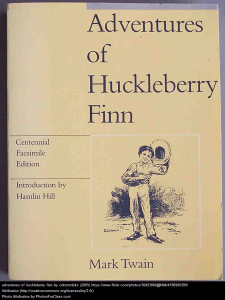*Potential Spoilers?*
While reading The Adventures of Huckleberry Finn by Mark Twain, the biggest theme is the idea that a natural life, one that is away from the civilized life, is the correct way to go. This, at the beginning end of the book, is primarily seen through Huckleberry’s father, in his abusive drunken state, drags Huckleberry out of his foster home and forces him to live in a small wooden shack away from civilization, because his father is angry with how Huckleberry is learning to read and write unlike his father. Huckleberry’s father believes that those who learn in a formal environment become full of themselves and become worse people because of it. Huckleberry’s father belittle’s Huckleberry by saying things like, “I won’t have it. I’ll lay for you my smarty” (Twain 21). Although Huckleberry’s father may introduce this idea of splitting from civilization in a harsh manner, as he is an abusive man, I believe that this lifestyle will grow on Huckleberry, as he was seen earlier in the book spending a lot of time out in nature with his friend Tom Sawyer. The author may be presenting this idea in this fashion to show that it may sound absurd to a person that civilization is not the way to go, but after giving it a chance it may show them that it is more beneficial than living in society.
I think that presenting this idea this way makes it more palatable to the reader, as any person that has been living in society by now is used to the idea, and enjoys the lifestyle. By presenting this idea through Huckleberry’s father at first, who is an abusive drunk who never learned to read or write well, Twain shows the reader and gives him the inclination that an idea like this is crazy, which aligns with the average reader’s beliefs. However, I feel like as the story goes on, Huckleberry will adapt to this idea, and it will grow on him, and he will learn why life in nature is better than life in society. This transition hopefully mirrors what the reader will experience, that at first an idea like this sounds a bit out there, but with time the reader will learn alongside Huckleberry. By doing this, Twain is able to better present such an idea to the reader without the reader being shocked and thrown for a loop. Overall I hope to see this strategy again with other ideas in the book, because, as I said in the last post about dialect, it is something that I have, up until now, only seen in Twain’s work.

